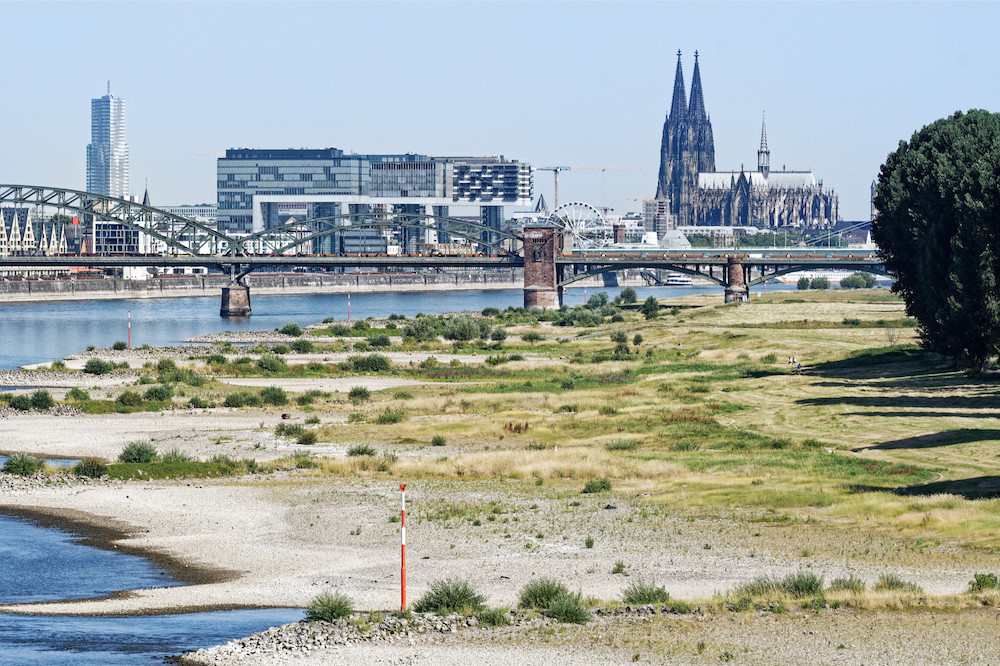The drought is also having an impact on inland waterway trade. In Luxembourg, the figures speak for themselves: from 1 to 18 August, 293,000 tonnes of goods were transported by barge on the Luxembourg Moselle in 2021. In 2022, only 58,000 tonnes will be transported.
Even though the flow is much lower, the water level of the Luxembourg Moselle is almost identical to normal. But this is only an appearance due to the presence of locks, which maintain the levels.
Navigation on the river is therefore not directly affected. Under normal circumstances, boats can be loaded up to three metres deep. At present, the limit is set at 2.80 metres due to fluctuating water flows.
Catastrophic situation on the Rhine
But there are problems upstream and downstream. Upstream, in France, where the first four locks on the Moselle (between Neuves-Maisons and Fontenoy-sur-Moselle) are closed, and boats can no longer navigate.
And especially downstream, in Germany. "On the Rhine, the situation is catastrophic," warns Philippe Proehs, who works in the Ministry of Mobility's river navigation department. "They have negative records, low water levels never seen before.”
To better understand the extent of the phenomenon, you need to know that in Cologne, the situation is called "low water" when the depth level is 2.10 metres. It is currently at 0.94 metres.
1/5th of the tonnage capacity
This phenomenon is striking not only because of its extent, but also because of its earliness. In 2018, such water levels were already observed, but only in October. This year, they are occurring two months earlier, suggesting a low water situation until the end of the year.
Ultimately, the impact on the transport of goods by barge in Luxembourg is severe. The consequences of the drought were already felt in July: 424,000 tonnes were transported over the whole month in 2021, and 329,000 in 2022, i.e. almost 100,000 tonnes less. But the situation worsened considerably in August with the continuing drought.
Between 1 and 18 August, the number of ships sailing to Luxembourg fell from 327 in 2021 to 210 in 2022. But it is above all the quantities of goods transported that have fallen drastically, as the barges cannot load as much. In August 2022, over the same period, the tonnage represented only one fifth of what was recorded in 2021.
Falling capacity and rising prices
The Luxport company, which is based in Luxembourg's only port, the port of Mertert, is heavily impacted, as barges have to limit the load of goods. "Last week, we were at 30% of the maximum load," explains Luxport's technical director, Gilles Braquet. "We have to take more barges for the same load, so the price per barge becomes higher, and consequently prices rise sharply."
This price increase is not without consequences for the inland waterway transport sector, since transporting certain products by barge is no longer profitable. "Sand, fertilisers or even road salt are no longer transported by barge, because there is no longer the necessary room for manoeuvre," explains Gilles Braquet. "In the current situation, trucks are preferred.
However, drought and low water levels are not the only reasons for the drop in freight flows. The war in Ukraine is partly responsible. Due to a drop in production and a poor economic situation, barge transport had already started to decline since April or May. "The two phenomena together aggravate the situation," says Gilles Braquet.
Unstable until the end of the year
In any case, the water levels are unlikely to return to normal before the end of the year. "If there is a wave of rain, we could enjoy a good water level for one or two weeks, but it is not stable," says Gilles Braquet.
In a context where the manifestations of the climate crisis are increasingly intense and frequent, such episodes of drought are now likely to be repeated. For the inland navigation sector, the public authorities will have to mobilise. "Industry and the private sector alone cannot provide the solutions," says Gilles Braquet. "Member states, particularly Germany, must also find solutions.”
Solutions that involve maintaining water levels, particularly by means of locks. But also by a potential excavation of the Rhine, even if this "will take years", evaluates Gilles Braquet. The private sector will have to consider building boats capable of navigating shallower waters. But taking into account the lifespan of a barge, it will take 10 to 20 years to renew the fleet, according to Gilles Braquet.
Read the original French version of this article on the site.
